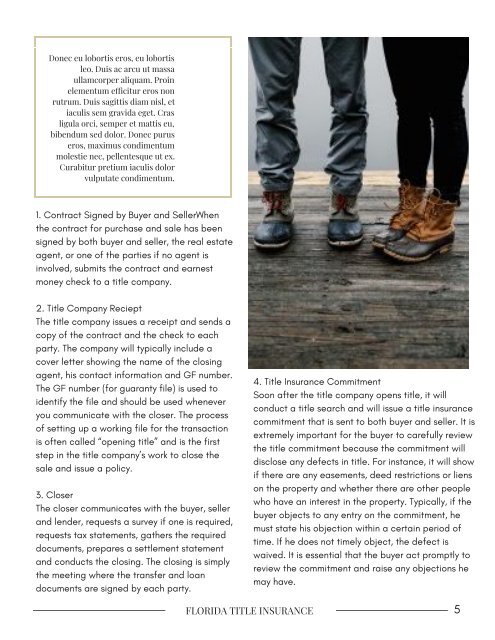How to Work with a Title Company
Create successful ePaper yourself
Turn your PDF publications into a flip-book with our unique Google optimized e-Paper software.
Donec eu lobortis eros, eu lobortis<br />
leo. Duis ac arcu ut massa<br />
ullamcorper aliquam. Proin<br />
elementum ecitur eros non<br />
rutrum. Duis sagittis diam nisl, et<br />
iaculis sem gravida eget. Cras<br />
ligula orci, semper et mattis eu,<br />
bibendum sed dolor. Donec purus<br />
eros, maximus condimentum<br />
molestie nec, pellentesque ut ex.<br />
Curabitur pretium iaculis dolor<br />
vulputate condimentum.<br />
1. Contract Signed by Buyer and SellerWhen<br />
the contract for purchase and sale has been<br />
signed by both buyer and seller, the real estate<br />
agent, or one of the parties if no agent is<br />
involved, submits the contract and earnest<br />
money check <strong>to</strong> a title company.<br />
2. <strong>Title</strong> <strong>Company</strong> Reciept<br />
The title company issues a receipt and sends a<br />
copy of the contract and the check <strong>to</strong> each<br />
party. The company will typically include a<br />
cover letter showing the name of the closing<br />
agent, his contact information and GF number.<br />
The GF number (for guaranty file) is used <strong>to</strong><br />
identify the file and should be used whenever<br />
you communicate <strong>with</strong> the closer. The process<br />
of setting up a working file for the transaction<br />
is often called “opening title” and is the first<br />
step in the title company’s work <strong>to</strong> close the<br />
sale and issue a policy.<br />
3. Closer<br />
The closer communicates <strong>with</strong> the buyer, seller<br />
and lender, requests a survey if one is required,<br />
requests tax statements, gathers the required<br />
documents, prepares a settlement statement<br />
and conducts the closing. The closing is simply<br />
the meeting where the transfer and loan<br />
documents are signed by each party.<br />
4. <strong>Title</strong> Insurance Commitment<br />
Soon after the title company opens title, it will<br />
conduct a title search and will issue a title insurance<br />
commitment that is sent <strong>to</strong> both buyer and seller. It is<br />
extremely important for the buyer <strong>to</strong> carefully review<br />
the title commitment because the commitment will<br />
disclose any defects in title. For instance, it will show<br />
if there are any easements, deed restrictions or liens<br />
on the property and whether there are other people<br />
who have an interest in the property. Typically, if the<br />
buyer objects <strong>to</strong> any entry on the commitment, he<br />
must state his objection <strong>with</strong>in a certain period of<br />
time. If he does not timely object, the defect is<br />
waived. It is essential that the buyer act promptly <strong>to</strong><br />
review the commitment and raise any objections he<br />
may have.<br />
FLORIDA TITLE INSURANCE 5


















